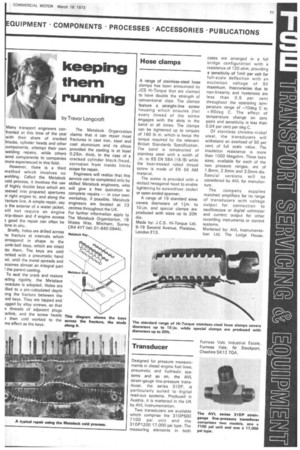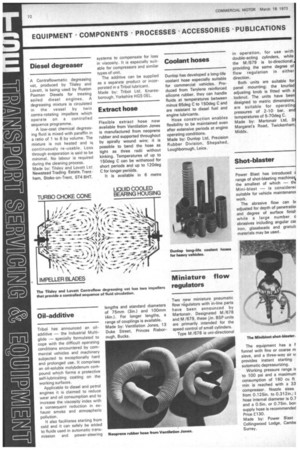keeping them running
Page 73

Page 74

If you've noticed an error in this article please click here to report it so we can fix it.
by Trevor Lon gcroft
Many transport engineers confronted at this time of the year with their share of cracked blocks, cylinder heads and other 'components, attempt their own !welding repairs, while others send components to companies more experienced in this field.
However, there is a third method which involves no welding. Called the Metalock cold process, it involves the use of highly ductile keys which are peened into prepared apertures at right angles to, and along the 'racture line. A simple repair, say :o the exterior of a water jacket, will not require an engine trip-down and if engine access s good the repair can often be lone in situ.
Briefly, holes are drilled across he fracture at intervals which orrespond in shape to the umb-bell keys, which are inlaid ito them. The keys are cold forked with a pneumatic hand )ol, until the metal spreads and ecomes almost an integral part I the parent casting.
To seal the crack and restore isting rigidity, the Metalace .ocedure is adopted. Holes are illed to a pre-calculated depth ong the fracture between the laid keys. They are tapped and ugged by alloy screws, so that e threads of adjacent plugs terlink, and the screw heads a then cold worked to the me effect as the keys.
The Metalock Organization claims that it can repair most fractures in cast iron, steel and cast aluminium and its alloys provided the casting is at least 0.25in. thick. In the case of a cracked cylinder block /head, corrosion from inside limits scope for repair.
Engineers will realize that this service can be completed only by skilled Metalock engineers, who will give a free quotation to complete repairs — in your own workshop, if possible. Metalock engineers are located at 23 centres throughout the UK.
For further information apply to The Metalock Organization, 18 Wates Way, Mitcham, Surrey CR4 4Y1(tel: 01-640 0944).
Hose clamps
A range of stainless-steel hose clamps has been announced by JCS Hi-Torque that are claimed to have double the strength of conventional clips. The clamps feature a straight-line screw housing which ensures that every thread of the screw engages with the slots in the band at all times. The clamps can be tightened up to torques of 160 lb in. which is twice the torque required by the relevant British Standards Specification, The band is constructed of stainless steel with a width of ,in. to BS EN 58A (18/8) while the heat-treated rolled thread screw is made of EN 56 AM material.
The screw is provided with a slotted hexagonal head to enable tightening by screwdriver, socket or open-ended spanner.
A range of 19 standard sizes covers diameters of 14-in. to 10in. and special clamps are produced with sizes up to 20ft dia.
Made by: J.C.S. Hi-Torque Ltd, 9-19 Second Avenue, Plaistow, London E13.
Transducer
Designed for pressure measurements in diesel engine fuel lines, pneumatic and hydraulic systems and so on, the AVL strain-gauge line-pressure transducer, the series 31 DP, is particularly suited to digital read-out systems. Produced in Austria, it is marketed in the UK by AVL Instrumentation.
Two transducers are available which comprise the 31DP500 7100 psi unit and the 310P1200 17,000 psi type. The measuring elements in both cases are arranged in a full bridge configuration with a resistance of 120 ohm, providing a sensitivity of lmV per volt for full-scale deflection with an excitation voltage of 5V maximum. Inaccuracies due to non-linearity and hysteresis are less than 0.5 per cent throughout the operating temperature range of –10deg C to + 90deg C. The effect of temperature change on zero point and sensitivity is less than 0.04 per cent per deg C.
Of stainless chrome-nickel steel, the transducers will withstand an overload of 50 per cent of full scale value. The insulation resistance is more than 1000 Megohm. Three bore sizes, available for each of the two pressure ranges, are of 1,8mm, 2.5mm and 3.0mm dia. Special versions will be considered by AVL for manufacture.
The company supplies matched amplifiers for its range of transducers with voltage output for connection to oscilloscope or digital voltmeter and current output for other recording instruments or control systems.
Marketed by: AVL Instrumentation Ltd, The Lodge House, Furness Vale Industrial Estate, Furness Vale, Nr Stockport, Cheshire SK12 7QA.
Diesel degreaser
A Contraflowmatic degreasing vat, produced by Tilsley and Lovett, is being used by Ruston Paxman Diesels for treating soiled diesel engines. A degreasing mixture is circulated in the vessel by twin contra-rotating impellers which operate on a controlled sequence programme.
A low-cost chemical degreasing fluid is mixed with paraffin in a ratio of 1 to 6 by volume. The mixture is not heated and is continuously re-usable. Loss through evaporation is said to be minimal. No labour is required during the cleaning process. Made by: Tilsley and Lovett Ltd Newstead Trading Estate, Trentham, Stoke-on-Trent, ST4 8HT.
Oil-additive
Tribol has announced an oiladditive — the Industrial Multiglide — specially formulated to cope with the difficult operating conditions encountered by commercial vehicles and machinery subjected to exceptionally hard and prolonged use. It comprises an oil-soluble molybdenum coolpound which forms a protective self-lubricating coating on the working surfaces.
Applicable to diesel and petrol engines it is claimed to reduce wear and oil consumption and to increase the viscosityindex with a consequent reduction in exhaust smoke and atmospheric pollution.
It also facilitates starting from cold and it can safely be added to fluids used in automatic transmission and power-steering systems to compensate for loss in viscosity. It is especially suitable for compressors and similar types of unit.
The additive can be supplied as a separate product or incorporated in a Tribol lubricant. Made by: Tribol Ltd, Knaresborough, Yorkshire H G5 OEL.
Extract hose
Flexible extract hose now available from Ventilation Jones is manufactured from neoprene rubber and supported throughout by spirally wound wire; it is possible to bend the hose as tight as three radii without kinking. Temperatures of up to 150deg C can be withstood for short periods and up to 120deg C for longer periods.
It is available in 6 metre lengths and standard diameters of 75mm (3in.) and 100mm (4in.). For longer lengths, a range of couplings is available. Made by: Ventilation Jones, 13 Duke Street, Princes Risborough, Bucks.
Coolant hoses
Dunlop has developed a long-life coolant hose especially suitable for commercial vehicles. Produced from Terylene reinforced silicone rubber, they can handle fluids at temperatures between minus 65deg C to 150deg C and are resistant to diesel fuel and engine lubricants.
Hose construction enables flexibility to be maintained even after extensive periods at engine operating conditions.
Made by: Dunlop Ltd, Precision Rubber Division, Shepshed, Loughborough, Leics.
Miniature flow regulators
Two new miniature pneumatic flow regulators with in-line parts have been announced by Martonair. Designated M/678 and M /679, these tin. BSP units are primarily intended for the speed control of small cylinders.
Type M /678 is uni-directional in operation, for use with double-acting cylinders, while the M /679 is bi-directional,, providing the same degree of flow regulation in either direction.
Both units are suitable for panel mounting; the knurled adjusting knob is fitted with a locknut. The units have been designed to metric dimensions, are suitable for operating pressures of 2-10 bar, and temperatures of 5-70deg C. Made by: Martonair Ltd, S Margaret's Road, Twickenham Middx.
Shot-blaster
Power Blast has introduced range of shot-blasting machines4 the smallest of which — the Mini-blast -is consideret suitable for vehicle maintenanc( work.
The abrasive flow can bo adjusted for depth of penetratioi and degree of surface finish while a large number c abrasives including angular ca iron, glassbeads and granub materials may be used.
The equipment has a f funnel with fine or coarse m sieve, and a three-way air vi provides instant starting automatic depressurizing.
Working pressure range to 100 psi and a maximum consumption of 160 cu ft rnin is reached with a 33 compressor. Nozzle sizes from 0.125in. to 0.312in.; t hose internal diameter is 0.7 and a 0.5in. or 0.75in. bon supply hose is recommended Price £130.
Made by: Power Blast Collingwood Lodge, Cambe Surrey.
























































































































